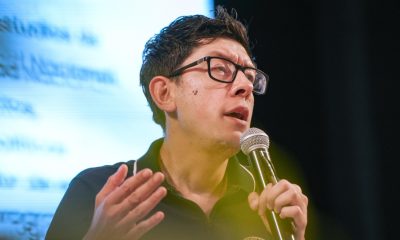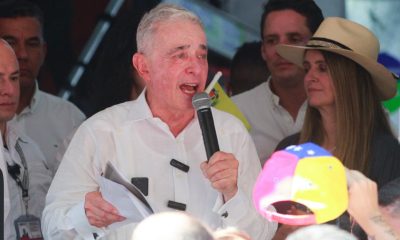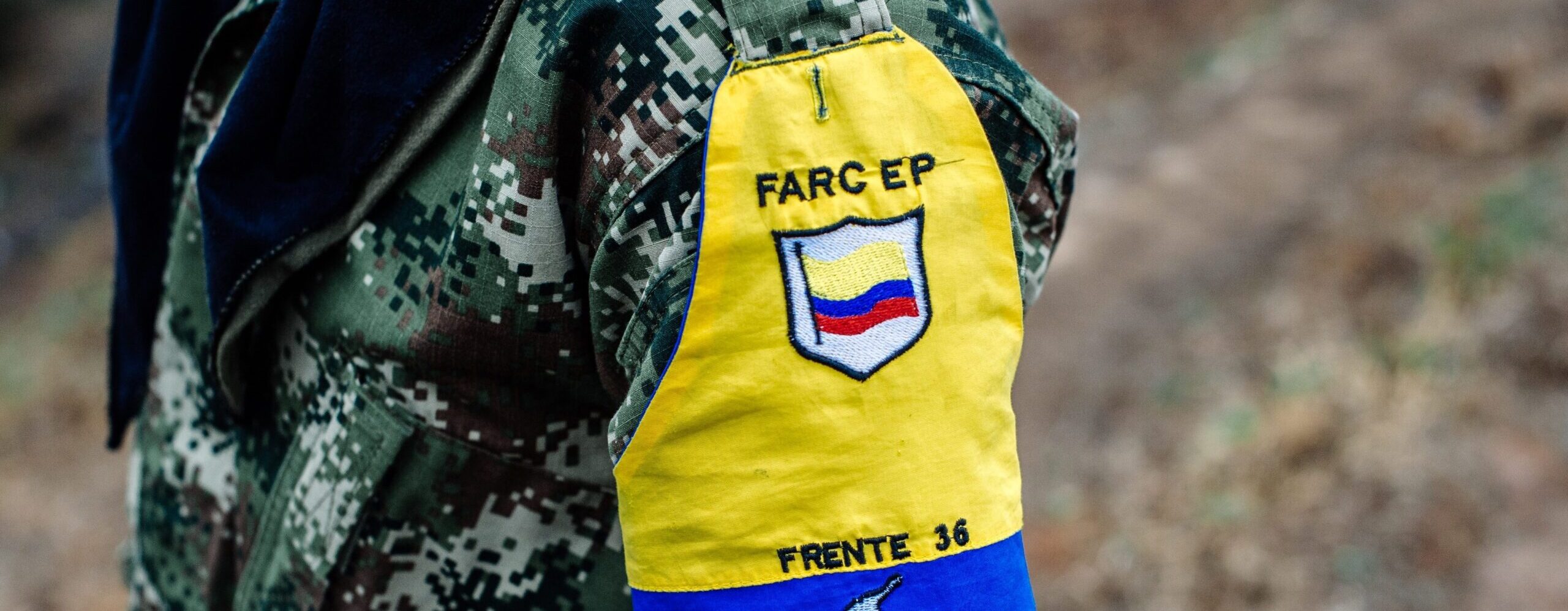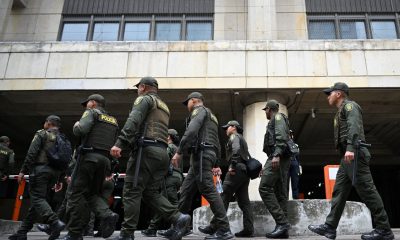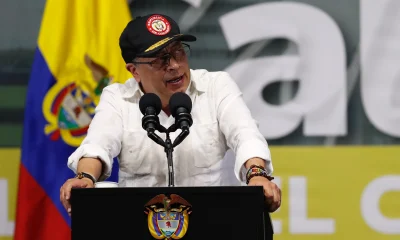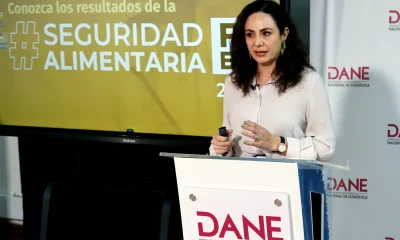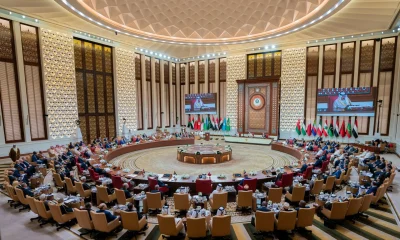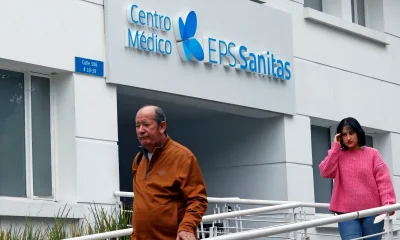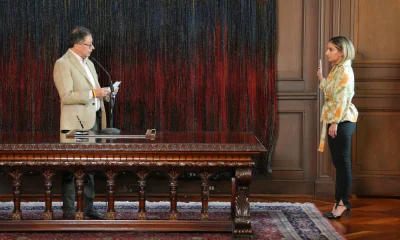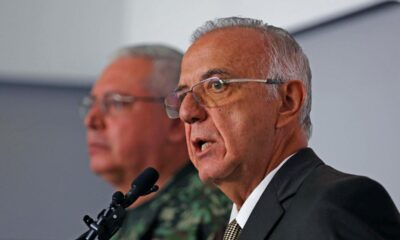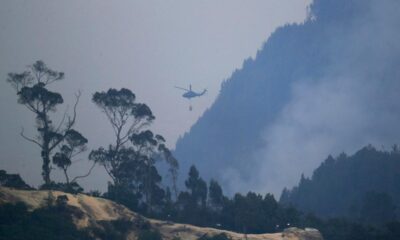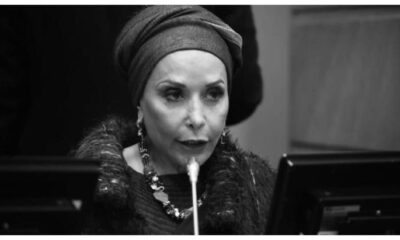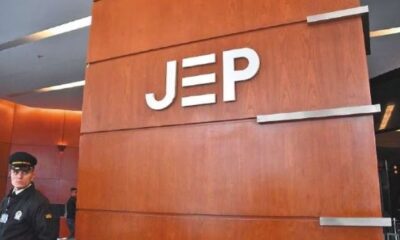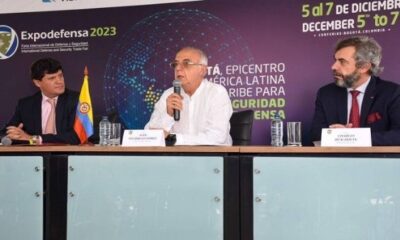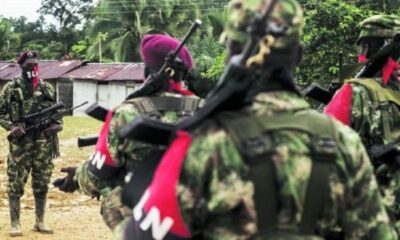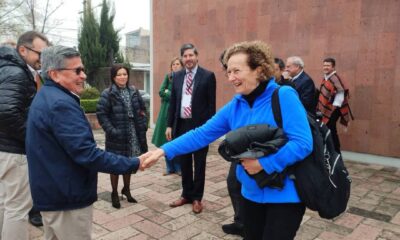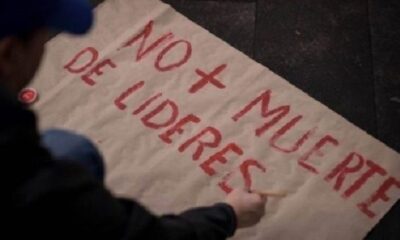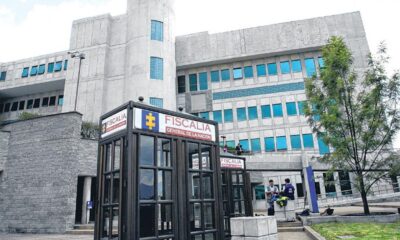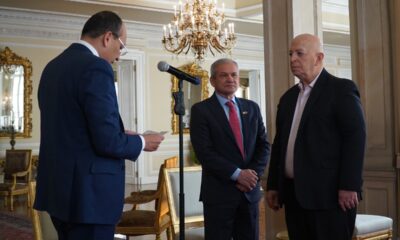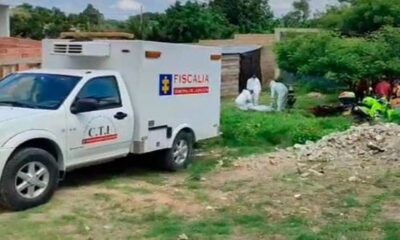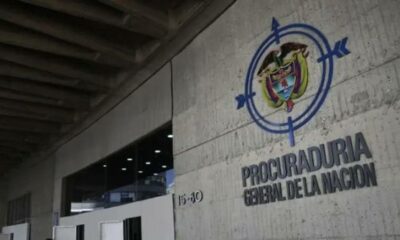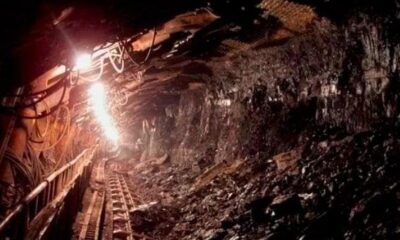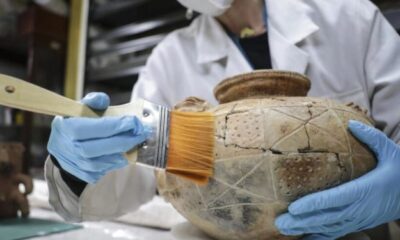International
Asking for permission to enter the house: the demand of Colombian indigenous people against Mennonites
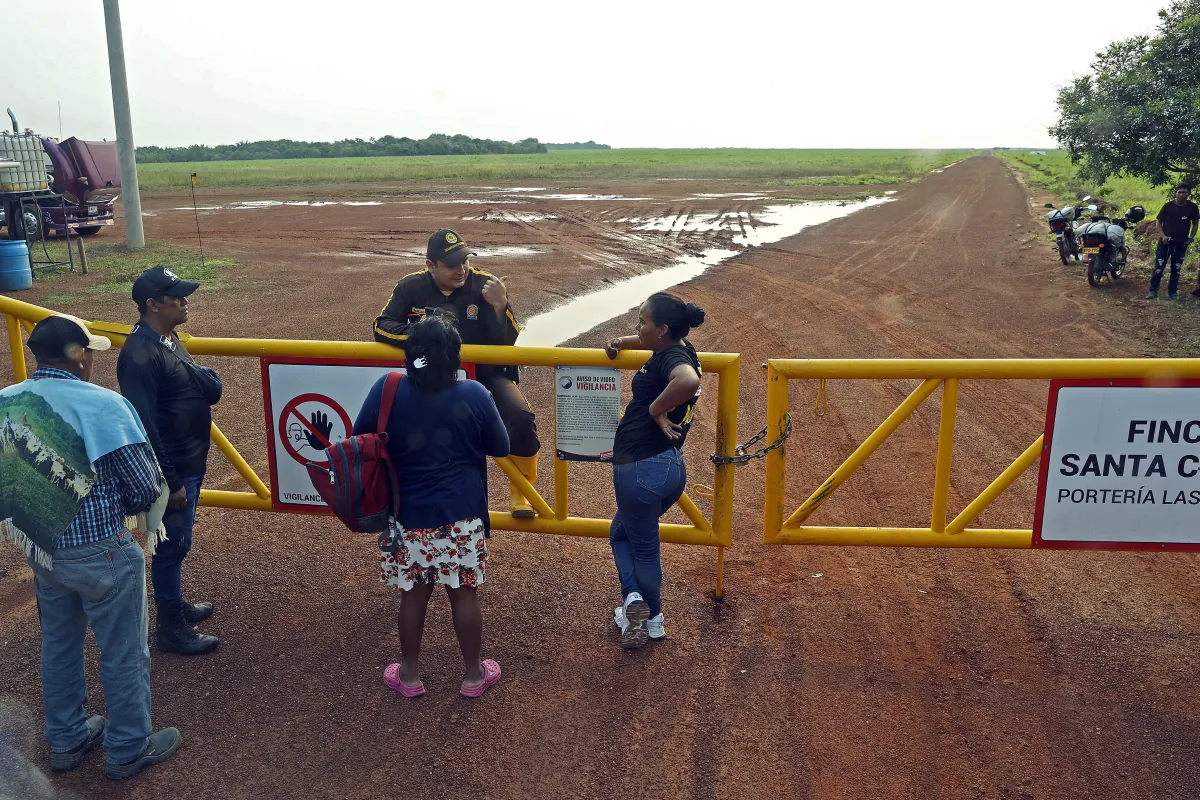
“Yesterday they returned us,” say the Sikuani indigenous authorities in front of the barrier that prevents them from entering their homes, waiting for authorization to continue, and denounce that their ancestral lands, in the Colombian department of Meta, are now owned by third parties who, they say, bought them irregularly.
On the Santa Catalina farm, owned by the meat company La Fazenda, they receive a refusal to pass by the entourage of journalists that accompanies them; they try their luck with the other entrance, that of the Mennonite ultra-religious community, which does authorize them to pass.
“Our grandparents are buried here,” says Jairo Ortiz in front of one of the sacred sites of the Sikuani, now in Mennonite territory.
“In times of violence they left here, they did not sell the land to anyone and left them thrown away, at that time other people who are not indigenous arrived and they took over,” says the captain, a position of authority of this semi-nomadad people displaced in several episodes of Colombian history.
In the Meta they lived until the so-called period of “violence”, which began in 1946, when they had to flee to the neighboring departments of Vichada and Guaviare. Then they returned but came back to persecution with the “guahibiadas” and “jaramilladas”, terms used to refer to the hunts of indigenous people to displace them from their lands and seize them.
A few years ago they returned to the land of their ancestors when the Colombian conflict lowered its intensity, but they realized that theirs was now in the hands of others, including the ultra-religious Mennite community that, coming from Mexico, found the promised land in the Colombian Oriental Plains.
The problem of land in Colombia is one of the great debts of the State; it is very difficult to know whose property each property is because many territories are not entitled.
Now, the 135 Sikuani families of this settlement claim their lands and denounce their appropriation and accumulation by foreigners.
The Mennonites, when they saw the potential of the Meta, hired a lawyer who advised them on the purchase of land, so “in principle” they are legal, explains Diana Quintero, a lawyer of the National Commission of Indigenous Territories, who accompanies the Sikuani in their lawsuit, explains to EFE.
The problem comes when the titles that the Mennonites bought are analyzed, awarded by the state National Land Agency because they were vacant of the nation.
The rule says the wastelands have to remain in the hands of their owner for a certain time, but those who were sold to the religious community did not meet this deadline and the indigenous peoples were not taken into account.
Another alleged irregularity, Quintero continues, is that the allocation of vacant lots has a limit of hectares, something called the Family Agricultural Unit (UAF), and the owners of these lands acquired more than allowed by law, incurring hoarding.
Quintero maintains that the Mennonites hoard because “although they say they are different families, they are part of a nucleus” and link all their lands in the same production process, exceeding the legal limit of UAF.
“Two years ago the Mennonites began to enter little by little. He could not be told anything because they have someone who supports them,” explains Alexander Álvarez, governor of the Iwitsulibo community, which brings together 80 families, in reference to the alleged alliances of the religious community.
According to the indigenous people, in the area there is the presence of paramilitaries of the Gaitanist Self-Defense of Colombia (AUC), allied with the Mennonites to provide them with security. They travel with motorcycles without a license plate and do not identify themselves, while all the Sikuani authorities report having received threats for their demands.
The Sikuani demand a total of 58,000 hectares to be distributed among the four communities and ask for a receipt to be made. Tsabilonia is the community that is closest to getting its claims, since it has been awarded – pending formalization – a territory in extinction of domain that belonged to drug traffickers, but they demand more hectares.
At the entrance of Tsabilonia the difference in the use of the land made by both communities is visible: on the Mennonite side there is not a single tree, only hectares waiting to be cultivated, and on the Sikuani side, pasture and native vegetation.
“They are pressuring us, we are being contaminated by foreign Mennonites who come from Germany, Canada and Mexico,” denounces Albarrubiela Gaitán, the traditional authority of the Barrulia territory: “We want to be calm in our territory, cultivating our uses and customs because as indigenous people we need our motherland to live in peace and freedom.”
The plantings of the Mennonites arrive almost at the door of the house of Albarrubiela; for the moment, the religious community continues to expand the agricultural border while the Sikuani expect the Colombian Justice to issue a decision on a land that went from hope to dispute.
International
U.S. Senate Rejects Budget, Bringing Government Closer to Shutdown Amid DHS Dispute

The U.S. Senate voted on Thursday against a budget proposal in a move aimed at pressuring changes at the Department of Homeland Security (DHS), following the killing of two civilians during a deployment of immigration agents in Minneapolis.
All Senate Democrats and seven Republican lawmakers voted against the bill, which requires 60 votes to advance, pushing the country closer to a partial government shutdown that would cut funding for several agencies, including the Pentagon and the Department of Health.
The rejection came as Senate leaders and the White House continue negotiations on a separate funding package for DHS that would allow reforms to the agency. Proposed measures include banning Immigration and Customs Enforcement (ICE) agents from wearing face coverings and requiring them to use body-worn cameras during operations.
The vote took place just hours after President Donald Trump said he was “close” to reaching an agreement with Democrats and did not believe the federal government would face another shutdown, following last year’s record stoppage.
“I don’t think the Democrats want a shutdown either, so we’ll work in a bipartisan way to avoid it. Hopefully, there will be no government shutdown. We’re working on that right now,” Trump said during a Cabinet meeting at the White House.
International
Trump Says Putin Agreed to One-Week Halt in Attacks on Ukraine Amid Extreme Cold

U.S. President Donald Trump said on Thursday that he secured a commitment from Russian President Vladimir Putinto halt attacks against Ukraine for one week, citing extreme weather conditions affecting the region.
“Because of the extreme cold (…) I personally asked Putin not to attack Kyiv or other cities and towns for a week. And he agreed. He was very pleasant,” Trump said during a Cabinet meeting broadcast by the White House.
Trump acknowledged that several advisers had questioned the decision to make the call.
“A lot of people told me not to waste the call because they wouldn’t agree. And he accepted. And we’re very happy they did, because they don’t need missiles hitting their towns and cities,” the president said.
According to Trump, Ukrainian authorities reacted with surprise to the announcement but welcomed the possibility of a temporary ceasefire.
“It’s extraordinarily cold, record cold (…) They say they’ve never experienced cold like this,” he added.
Ukrainian President Volodymyr Zelensky later commented on the announcement, expressing hope that the agreement would be honored.
International
Storm Kristin Kills Five in Portugal, Leaves Nearly 500,000 Without Power

Storm Kristin, which battered Portugal with heavy rain and strong winds early Wednesday, has left at least five people dead, while nearly half a million residents remained without electricity as of Thursday, according to updated figures from authorities.
The revised death toll was confirmed to AFP by a spokesperson for the National Emergency and Civil Protection Authority (ANPEC). On Wednesday, the agency had reported four fatalities.
Meanwhile, E-Redes, the country’s electricity distribution network operator, said that around 450,000 customers were still without power, particularly in central Portugal.
Emergency services responded to approximately 1,500 incidents between midnight and 8:00 a.m. local time on Wednesday, as the storm caused widespread disruptions.
The Portuguese government described Kristin as an “extreme weather event” that inflicted significant damage across several regions of the country. At the height of the storm, as many as 850,000 households and institutions lost electricity during the early hours of Wednesday.
Several municipalities ordered the closure of schools, many of which remained shut on Thursday due to ongoing adverse conditions.
Ricardo Costa, regional deputy commander of the Leiria Fire Brigade, said residents continue to seek assistance as rainfall persists.
“Even though the rain is not extremely intense, it is causing extensive damage to homes,” he noted.
In Figueira da Foz, a coastal city in central Portugal, strong winds toppled a giant Ferris wheel, underscoring the severity of the storm.
-

 Central America4 days ago
Central America4 days agoGuatemala seizes over a ton of cocaine hidden in flour at Pacific port
-

 International4 days ago
International4 days agoHistoric snowstorm paralyzes Toronto after 60 centimeters of snow
-

 Central America3 days ago
Central America3 days agoGuatemala Police Arrest Prison Guard Caught in the Act of Extortion
-

 Central America3 days ago
Central America3 days agoBukele leads public trust rankings as UCA survey highlights gains in security
-

 Central America3 days ago
Central America3 days agoHonduras swears in conservative president Asfura after disputed election
-

 International4 days ago
International4 days agoSpain’s irregular migrant population rises to 840,000, study finds
-

 International2 days ago
International2 days agoFootball Fan Killed in Clashes After Colombian League Match
-

 International3 days ago
International3 days agoWinter Storm Fern Leaves 30 Dead and Over One Million Without Power Across the U.S.
-

 Central America2 days ago
Central America2 days agoGuatemala President Says Starlink Terminal Found Inside Prison
-

 Sin categoría3 days ago
Sin categoría3 days agoEight Killed in Series of Armed Attacks in Ecuador’s Manabí Province
-

 International3 days ago
International3 days agoDoomsday clock moves to 85 seconds before midnight amid rising global risks
-

 International4 days ago
International4 days agoRights group says nearly 6,000 killed in Iran protest crackdown
-

 International3 days ago
International3 days agoSpain approves plan to regularize up to 500,000 migrants in Historic Shift
-

 International2 days ago
International2 days agoRubio Says U.S. Could Participate in Follow-Up Russia-Ukraine Talks
-

 International2 days ago
International2 days agoMissing Spanish Sailor Rescued After 11 Days Adrift in Mediterranean
-

 Sin categoría3 days ago
Sin categoría3 days agoEl Salvador Launches Fourth Year of Ocean Mission to Protect Marine Ecosystems
-

 International4 days ago
International4 days agoVenezuela frees at least 80 political prisoners, NGO says
-

 International4 days ago
International4 days agoEU launches new probe into X over AI-generated fake nude images
-

 International24 hours ago
International24 hours agoU.S. Senate Rejects Budget, Bringing Government Closer to Shutdown Amid DHS Dispute
-

 International4 days ago
International4 days agoSevere winter storm grips U.S., leaves multiple dead as extreme cold persists
-

 International24 hours ago
International24 hours agoTrump Says Putin Agreed to One-Week Halt in Attacks on Ukraine Amid Extreme Cold
-

 International4 days ago
International4 days agoFrance debates ban on social media for children under 15
-

 International24 hours ago
International24 hours agoStorm Kristin Kills Five in Portugal, Leaves Nearly 500,000 Without Power
-

 International24 hours ago
International24 hours agoMan Arrested After Vehicle Crashes Into Jewish Institution in Brooklyn































